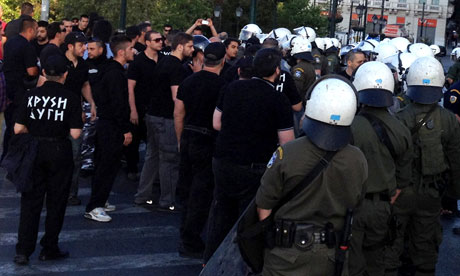Israel Air Force bombs Syrian chemical and other targets from Lebanon, Golan
DEBKAfile Special Report

May 4, 2013, 5:41 AM (GMT+02:00) Tags: Iran, Syria, Hizballah, IDF, bunker-busters,
Israeli F15 jet over Lebanon
American sources reported Israeli air strikes Saturday, May 4, against a number of targets in Syria including a chemical weapons depot outside Damascus. They were carried out remotely from Lebanese air space and the Golan starting Friday and continuing up until early Saturday, May 3. Neither Damascus nor Jerusalem has yet confirmed the attacks in which according to US sources 16 IAF warplanes took part. According to one report, Israeli jets were seen early Saturday circling over Assad's presidential compound in Damascus before moving on to target a weapons site. The Israeli jets reportedly received fire but returned to base unscathed.
Some sources say the target attacked was a convoy transporting chemical arms to the Lebanese Hizballah, which Israeli leaders have vowed to prevent.
DEBKAfile’s military sources say the start of the Israeli air force operation can be fixed by the sirens set off over the Golan Friday afternoon and again before dawn Saturday. The IDF spokesman said they were set off by a “technical glitch.” They now prove to have been triggered automatically by the Israeli aerial movements.
Friday, Lebanon reported a number of Israeli warplane intrusions of its air space.
DEBKAfile reported earlier that this week, thousands of Basij militiamen landed in Syria, establishing an Iranian military presence opposite Israel from Syria as well as Lebanon. They joined a comparable number of Hizballah militiamen fighting for the Bashar regime.
See this earlier DEBKAfile report:
US officials recently gave Israel a video demonstration of the new features which enable its biggest bunker buster bomb (Massive Ordnance Penetrator) to destroy Iran’s underground uranium enrichment plant at Fordo near Qom, in a bid to dissuade Israel from a unilateral attack on Iran’s nuclear facilities.
This is reported by the Wall Street Journal.
The video displayed the improved bomb, which Israel does not have, as hitting the ground near its target and setting off a massive underground explosion.
DEBKAfile’s military sources report that this videotaped demonstration was in line with the Obama administration’s latest campaign to convince Israel that the US is getting ready to strike Iran itself.
In actual fact, the improved American MOP is not news - any more than the Israeli Air Force’s possession of bombs capable of penetrating the Fordo underground plant. This capability has given Israeli officials the confidence to assert that Israel can destroy Iran’s nuclear facilities on its own.
What Washington has in common with Jerusalem is that while both make no secret of their capabilities – and Israeli leaders are also free with threatening rhetoric - neither is actually exercising them.
The only parties on the move are Iran and Hizballah.
At the end of the week, DEBKAfile’s military sources report that both established a military presence in Syria and Lebanon, just across Israel’s two northern borders. An Iranian airlift placed Iranian boots on the ground in Syria for the first time in more than two years of its civil war. It was also the first time Israel had ever seen uniformed Iranian soldiers present at close quarters on the soil of a close neighbor.
The arrivals are members of the violent Basij volunteer militia which is trained in urban combat tactics for suppressing anti-regime unrest in Iranian cities. They are the first Iranian troops to confront Syrian rebels in combat. Roughly 6,000-8,000 militiamen have arrived so far – a figure comparable to the size of the Hizhballah elite units fighting for Bashar Assad in Syria.
The Basij militiamen were stationed in Damascus and sent to guard Syrian Shiite border villages situated opposite Hizballah-controlled South Lebanon. This deployment has placed Iranian troops opposite the intersection of the Israeli, Syrian and Lebanese borders.
Iran’s expanding military intervention in Syria accounts partly for this week’s surprise call-up of thousands of Israeli reservists for duty on the country’s northern borders. Although they were sent home after 24 hours to disguise their mission and calm rising tensions, they were in fact ordered to report back Sunday, May 5. These reservists will then pick up the gear and weapons needed for real combat, and take up positions along Israel’s borders with Syria and Lebanon.
Sirens blared over parts of the Golan Friday, May 3, their sensors touched off by the preparations for these military movements. The official pretext offered of a “technical glitch” was about as convincing as the Israeli military spokesman’s attempt to deny knowing who sent a drone from Beirut towards Israel on April 25.
The sirens on the Golan were apparently not loud enough to be heard in Washington and Jerusalem.

























